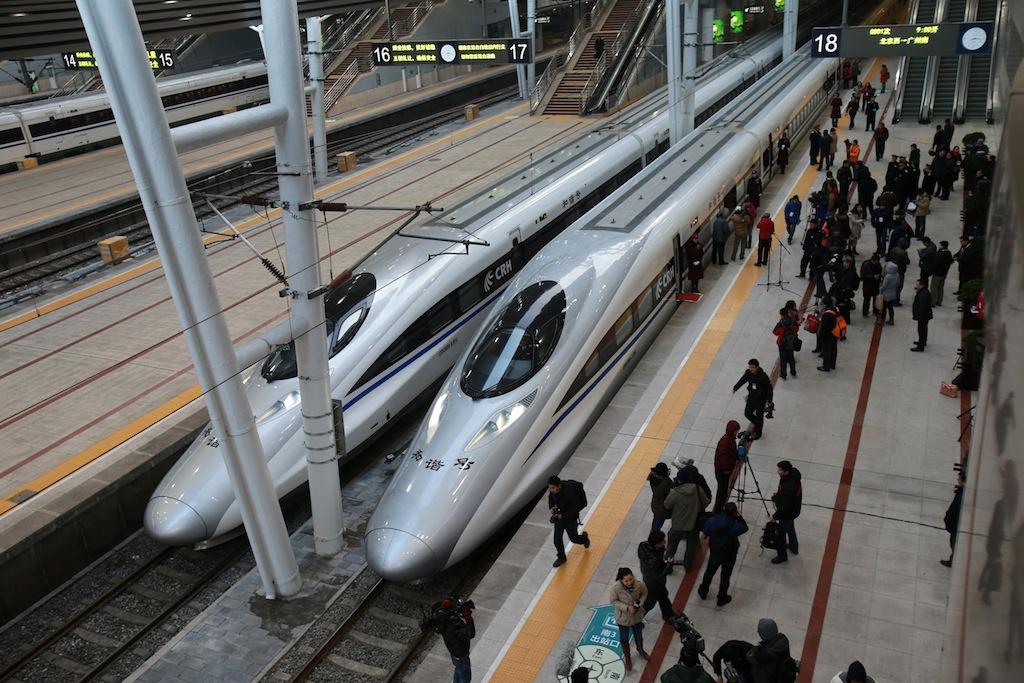A reading of China’s roadmap for market-oriented reforms
The 1,425-mile line between Beijing and Guangzhou, which started on Dec. 26 2012, is the world’s longest high-speed rail route. To continue its economic miracle, Chinese leaders have indicated that they will rely increasingly on markets.
BEIJING, China — Out of a long list of China's recently issued economic reform pledges, which outline the blueprint that shapes the direction of economic reforms in the world's second-largest economy for the next decade, one of the biggest bright spots, in the authors' eyes, was a vow to "give the market a decisive role in resource allocation and give better play to the role of government."
The upgrading of the market's role is a revolutionary step forward that may lead to broad positive changes in China's economy.
The Biggest Bright Spot
Resource allocation is the key to economic development, and for the first time in Chinese official document, the market is assigned a "decisive role" in allocating resources. In Chinese official documents, words matter a great deal. Even some of the seemingly minor initiatives in new wording may lead to revolutionary changes.
Over the last two decades, the market had been defined as a "basic" role in resource allocation, a status given when China decided to build a "socialist market economy" in 1992. That wording had been repeated as recently as last month, when Chinese president Xi Jinping said in a speech that China would "let the market play its basic role in resource allocation to a greater degree and in a wider scope."
The minor wording changes manifest major upgrade of the market's role and indicate significant market-oriented reforms in the coming decade.
Another reason as to why letting the market play a decisive role is one of the biggest bright spots in China's economic reform pledges is that it touches the core of China's economic problems.
Reform is the key to resolve China's fundamental economic ailments, and the core solution is the proper handling of the relationship between the government and the market, because fundamentally, the majority of China's major economic problems in the past stem from the unbalance between the government and the market, which lowered the efficiency in resource allocation.
Pledging the market a decisive role in resource allocation and better play to the role of government gets to the heart of the matter and prescribes a "cure-all" for China's economic ailments.
Promising a decisive role for the market may lead to a broad spectrum of economic reforms. It would manifest itself in a wide range of economic reforms, including those in the financial sector, real estate, public governance as well as removing administrative barriers to private capital, among others, paving the way for broad positive changes in the world's second-biggest economy.
Far-reaching Implications
The authors' reading of the "decisive role" for the market is that resource allocation could be influenced and guided by other forces, but it is only the market that plays the decisive role in this process. It will hence have significant, wide-ranging implications.
The relationship between the government and the market is expected to be reorganized. The emphasis on a "better" role played by the government, rather than a stronger role, signals less government intervention in the economy, allowing for an elevated role of the private sector and freer markets.
Pledging a decisive role for the market means that private businesses will be given more sway in the economy. Although "public ownership plays an important role" was reaffirmed in the recently-released communiqué, for the first time in history a declaration that "both public and non-public sectors are important components of the socialist market economy and significant bases for economic and social development" was written in the Chinese official document. This puts private sector on a level playing field with the public sector, manifesting an elevated role of the private economy.
China's commitment to more market-oriented reforms signifies a better business environment for private and foreign enterprises alike and should bring them more opportunities, as the prices of fuels, electricity, natural gas, water and other key resources become more market-determined, which would open up sectors previously dominated by China's state-owned enterprises (SOEs) to private and foreign firms. A level playing field based on laws and regulations, with less monopoly and government intervention and open for all forms of market entities will gradually be established.
Improving the role of the market comes at the right time and will unleash new vitality into China's long-term economic growth by boosting efficiency and transitioning to a more sustainable development model.
With China's roadmap for market reforms coming into focus, the next step for China is to translated these principles into specifics and set the reforms in motion.
However, any expectation of a great leap forward in pushing reforms would be unrealistic, since for any country, reforms of such magnitude cannot happen overnight. The reform in China can only come step by step, and in the short term, it will even cause some pains for the Chinese economy.
But as time goes on, people would see just how committed the Chinese new leadership is to economic reforms and how the reform would pave the way for China's economic miracle over the next decade.
Mingshen Shi is the founder of the Securities Times in China and former first deputy head of the economic department at People's Daily. Zhenyu Li is a contributing columnist for some of the world's leading trade publications and the editor-in-chief of the business channel at People's Daily Online.
Every day, reporters and producers at The World are hard at work bringing you human-centered news from across the globe. But we can’t do it without you. We need your support to ensure we can continue this work for another year.
Make a gift today, and you’ll help us unlock a matching gift of $67,000!
